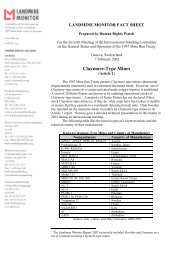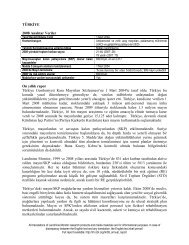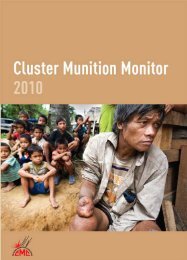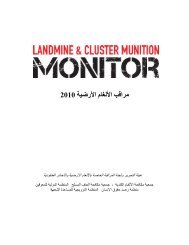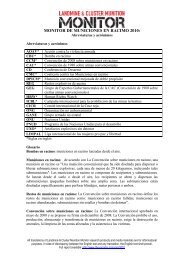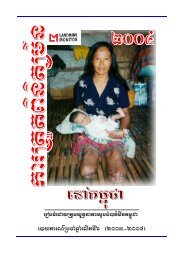Download PDF - Landmine and Cluster Munition Monitor
Download PDF - Landmine and Cluster Munition Monitor
Download PDF - Landmine and Cluster Munition Monitor
Create successful ePaper yourself
Turn your PDF publications into a flip-book with our unique Google optimized e-Paper software.
Casualties <strong>and</strong> Victim Assistance<br />
National plans<br />
The Vientiane Action Plan reiterates the Convention on <strong>Cluster</strong> <strong>Munition</strong>s obligation to adapt or develop a comprehensive<br />
national plan of action, including time frames <strong>and</strong> budget to carry out victim assistance activities, but no specific time<br />
limit was set for this to be achieved.<br />
Among the States Parties, Afghanistan’s victim assistance plan ended in 2011 <strong>and</strong> had not yet been renewed or replaced<br />
as of mid-2012. 32 Lebanon developed a basic strategy for victim assistance in 2011. A complex victim assistance plan<br />
was still under development in Lao PDR (as it has been since 2008), but the plan <strong>and</strong> related policy papers had not been<br />
completed by mid-2012. BiH adopted a ten-year victim assistance plan in 2009, but it has not been adapted to address<br />
its new obligations under the Convention on <strong>Cluster</strong> <strong>Munition</strong>s <strong>and</strong> the objectives are not measurable. 33 Albania 34 <strong>and</strong><br />
Croatia 35 have victim assistance plans in place, which have been revised to take into account the Convention on <strong>Cluster</strong><br />
<strong>Munition</strong>s. Mozambique’s national plan for persons with disabilities explicitly includes cluster munition victims; as of<br />
mid-2012, the plan had been completed but not yet approved. 36<br />
All victim assistance plans lacked dedicated funding, although plans for BiH, Croatia, Lao PDR, Lebanon <strong>and</strong><br />
Mozambique included budgets or estimated costs. No victim assistance plan has been developed by Guinea-Bissau,<br />
Montenegro, or Sierra Leone.<br />
Among signatories, Angola’s existing plan ended in 2011. 37 A victim assistance plan for Chad was approved in May<br />
2012. 38 Colombia lacked a national victim assistance plan, but legislation passed in June 2011 dedicating significant<br />
government resources for conflict victims was expected to improve access to victim assistance. 39 The DRC developed<br />
a new plan in 2011. 40 Iraq has developed some national action points instead of a victim assistance plan. 41 Ug<strong>and</strong>a was<br />
working from a victim assistance plan that was comprehensively revised in 2010. 42<br />
Reporting <strong>and</strong> monitoring<br />
Under Article 7 of the convention, States Parties are required to submit reports on the status <strong>and</strong> progress of implementation<br />
of all victim assistance. 43 In their Article 7 reports, Lao PDR reported on international funding to victim assistance NGOs,<br />
while Lebanon reported on victim assistance activities that were supported with national funds <strong>and</strong> those for which<br />
international assistance was needed. Mozambique reported on progress to develop the second National Plan of Action<br />
on Disability, which includes cluster munition victims, <strong>and</strong> indicated the need for national <strong>and</strong> international funds for<br />
its implementation. Albania, BiH, <strong>and</strong> Croatia also included victim assistance reporting in the appropriate form of their<br />
transparency reports.<br />
Several States Parties with few casualties have yet to submit their Article 7 reports (Guinea-Bissau, Montenegro, <strong>and</strong><br />
Sierra Leone), while Afghanistan’s initial report is due by 28 August 2012. The DRC submitted a voluntary Article 7<br />
reporting for 2011, but included only brief information on victim assistance.<br />
Role of survivors<br />
<strong>Cluster</strong> munition victims were key in the development <strong>and</strong> adoption of the Convention on <strong>Cluster</strong> <strong>Munition</strong>s <strong>and</strong> the<br />
convention calls on States Parties to “closely consult with <strong>and</strong> actively involve cluster munition victims <strong>and</strong> their<br />
representative organisations” to fulfill victim assistance obligations. The Vientiane Action Plan states that States Parties<br />
must actively involve cluster munitions victims <strong>and</strong> their representative organizations in the work of the convention,<br />
32<br />
Response to <strong>Monitor</strong> questionnaire by Suraya Paikan, Deputy Minister, Ministry of Labour, Social Affairs, Martyrs <strong>and</strong> Disabled<br />
(MoLSAMD), Kabul, 9 April 2012.<br />
33<br />
See, BHMAC, “Victim Assistance Sub-Strategy in BiH: 2009–2019,” (“Podstrategija za pomoć žrtvama mina u Bosni i Hercegovini: 2009–<br />
2019”), Sarajevo, (undated but 2010).<br />
34<br />
Statement of Albania, Mine Ban Treaty St<strong>and</strong>ing Committee on Victim Assistance <strong>and</strong> Socio-economic Reintegration, Geneva, 23 May 2012.<br />
35<br />
Croatia, Convention on <strong>Cluster</strong> <strong>Munition</strong>s Article 7 Report, Form H, 10 April 2012; <strong>and</strong> Statement of Croatia, Convention on <strong>Cluster</strong><br />
<strong>Munition</strong>s Intersessional Meeting, Working Group on Victim Assistance, Geneva, 16 April 2012.<br />
36<br />
Email from Macario Dubalelane, Head of Department for Persons with Disabilities, Ministry of Women <strong>and</strong> Social Action (Ministério da<br />
Mulher e da Acção Social, MMAS), 24 June 2012.<br />
37<br />
CNIDAH, “Draft relatório do workshop de avaliação do pniavm 2007 – 2011, (“Draft Report of the Workshop to Evaulate the PNIAVM<br />
2007-2011”), Lu<strong>and</strong>a, 13 April 2012.<br />
38<br />
Statement of Chad, Mine Ban Treaty St<strong>and</strong>ing Committee on Victim Assistance <strong>and</strong> Socioeconomic Reintegration, Geneva, 23 May 2012<br />
39<br />
Regulations to implement the law were approved in December 2011 <strong>and</strong> it had not yet had an impact on the lives of survivors as of April 2012.<br />
Responses to <strong>Monitor</strong> questionnaire by Johana Huertas, National Mine Action Coordinator, H<strong>and</strong>icap International (HI), 30 March 2012; <strong>and</strong><br />
by Sonia Matilde Eljach Polo, Director, Multilateral Policy Issues, Ministry of Foreign Affairs, 19 April 2012; <strong>and</strong> Statement of Colombia,<br />
Mine Ban Treaty St<strong>and</strong>ing Committee on Victim Assistance <strong>and</strong> Socio-economic Reintegration, Geneva, 22 June 2011.<br />
40<br />
Statement of DRC, Mine Ban Treaty St<strong>and</strong>ing Committee on Victim Assistance <strong>and</strong> Socio-economic Reintegration, Geneva, 22 June 2011;<br />
<strong>and</strong> interview with Jean Marie Kiadi Ntoto, UN Mine Action Coordination Center (UNMACC), Kinshasa, 17 April 2011.<br />
41<br />
Interviews with Maythem Obead, Head of Community Liaison Department, Directorate of Mine Action (DMA); Bakshan Asaad, Head of<br />
Rehabilitation Department, Kurdistan Ministry of Health; <strong>and</strong> Soran Majeed, Mine Victim Assistance Officer, GDMA for Iraqi Kurdistan, in<br />
Geneva, 21 May 2012<br />
42<br />
Statement of Ug<strong>and</strong>a, Mine Ban Treaty Eleventh Meeting of States Parties, Phnom Penh, 29 November 2011.<br />
43<br />
Victim assistance reporting under the Convention on <strong>Cluster</strong> <strong>Munition</strong>s is obligatory, unlike the Mine Ban Treaty’s voluntary reporting on<br />
victim assistance.<br />
57



